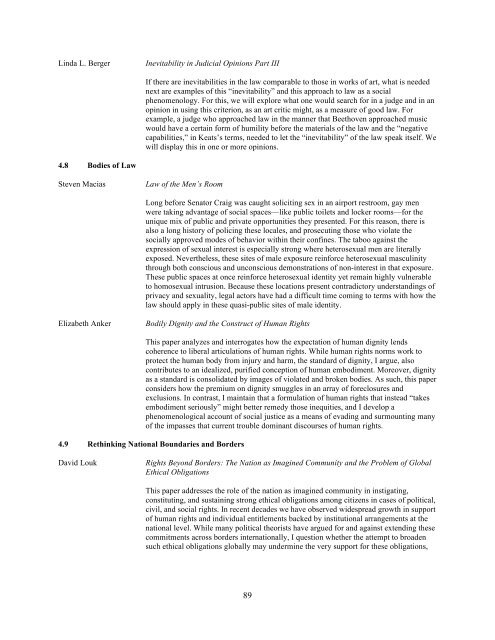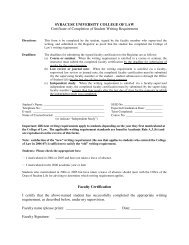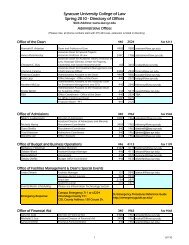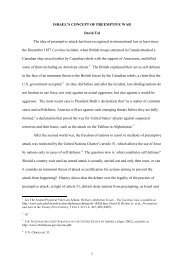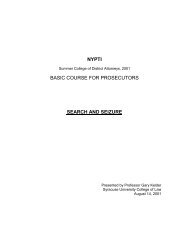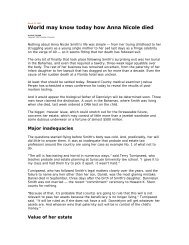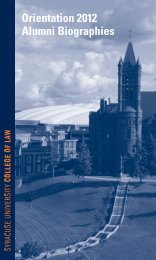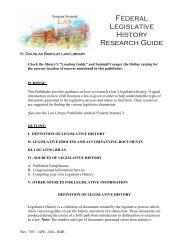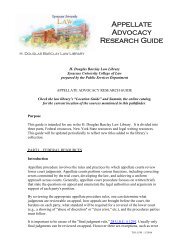2011 Conference Program (PDF) - Syracuse University College of Law
2011 Conference Program (PDF) - Syracuse University College of Law
2011 Conference Program (PDF) - Syracuse University College of Law
You also want an ePaper? Increase the reach of your titles
YUMPU automatically turns print PDFs into web optimized ePapers that Google loves.
Linda L. Berger<br />
Inevitability in Judicial Opinions Part III<br />
If there are inevitabilities in the law comparable to those in works <strong>of</strong> art, what is needed<br />
next are examples <strong>of</strong> this “inevitability” and this approach to law as a social<br />
phenomenology. For this, we will explore what one would search for in a judge and in an<br />
opinion in using this criterion, as an art critic might, as a measure <strong>of</strong> good law. For<br />
example, a judge who approached law in the manner that Beethoven approached music<br />
would have a certain form <strong>of</strong> humility before the materials <strong>of</strong> the law and the “negative<br />
capabilities,” in Keats’s terms, needed to let the “inevitability” <strong>of</strong> the law speak itself. We<br />
will display this in one or more opinions.<br />
4.8 Bodies <strong>of</strong> <strong>Law</strong><br />
Steven Macias<br />
<strong>Law</strong> <strong>of</strong> the Men’s Room<br />
Long before Senator Craig was caught soliciting sex in an airport restroom, gay men<br />
were taking advantage <strong>of</strong> social spaces—like public toilets and locker rooms—for the<br />
unique mix <strong>of</strong> public and private opportunities they presented. For this reason, there is<br />
also a long history <strong>of</strong> policing these locales, and prosecuting those who violate the<br />
socially approved modes <strong>of</strong> behavior within their confines. The taboo against the<br />
expression <strong>of</strong> sexual interest is especially strong where heterosexual men are literally<br />
exposed. Nevertheless, these sites <strong>of</strong> male exposure reinforce heterosexual masculinity<br />
through both conscious and unconscious demonstrations <strong>of</strong> non-interest in that exposure.<br />
These public spaces at once reinforce heterosexual identity yet remain highly vulnerable<br />
to homosexual intrusion. Because these locations present contradictory understandings <strong>of</strong><br />
privacy and sexuality, legal actors have had a difficult time coming to terms with how the<br />
law should apply in these quasi-public sites <strong>of</strong> male identity.<br />
Elizabeth Anker<br />
Bodily Dignity and the Construct <strong>of</strong> Human Rights<br />
This paper analyzes and interrogates how the expectation <strong>of</strong> human dignity lends<br />
coherence to liberal articulations <strong>of</strong> human rights. While human rights norms work to<br />
protect the human body from injury and harm, the standard <strong>of</strong> dignity, I argue, also<br />
contributes to an idealized, purified conception <strong>of</strong> human embodiment. Moreover, dignity<br />
as a standard is consolidated by images <strong>of</strong> violated and broken bodies. As such, this paper<br />
considers how the premium on dignity smuggles in an array <strong>of</strong> foreclosures and<br />
exclusions. In contrast, I maintain that a formulation <strong>of</strong> human rights that instead “takes<br />
embodiment seriously” might better remedy those inequities, and I develop a<br />
phenomenological account <strong>of</strong> social justice as a means <strong>of</strong> evading and surmounting many<br />
<strong>of</strong> the impasses that current trouble dominant discourses <strong>of</strong> human rights.<br />
4.9 Rethinking National Boundaries and Borders<br />
David Louk<br />
Rights Beyond Borders: The Nation as Imagined Community and the Problem <strong>of</strong> Global<br />
Ethical Obligations<br />
This paper addresses the role <strong>of</strong> the nation as imagined community in instigating,<br />
constituting, and sustaining strong ethical obligations among citizens in cases <strong>of</strong> political,<br />
civil, and social rights. In recent decades we have observed widespread growth in support<br />
<strong>of</strong> human rights and individual entitlements backed by institutional arrangements at the<br />
national level. While many political theorists have argued for and against extending these<br />
commitments across borders internationally, I question whether the attempt to broaden<br />
such ethical obligations globally may undermine the very support for these obligations,<br />
!<br />
89


